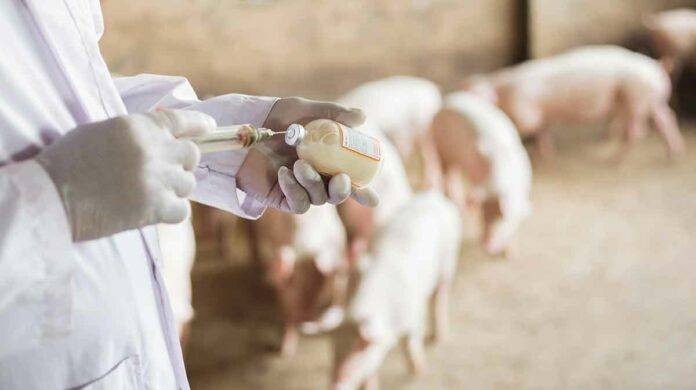The Pig Health and Welfare Council Antimicrobial Usage Subgroup is currently in the process of developing the next set of pig sector antibiotic targets, with a specific focus on biosecurity in response to the increase in antibiotic usage observed last year. The completion of RUMA’s Target Task Force (TTF2) for antibiotic stewardship in UK farming in 2024 has paved the way for the development of TTF3, which will be spearheaded by Richard Lister and Dr. Alex Thomsett, representing producers and the Pig Veterinary Society (PVS) respectively.
The objectives of TTF3 will encompass both numerical and non-numerical goals, which will be shared at the NPA spring regional meetings and the PVS spring meeting to solicit feedback from stakeholders. Mr. Lister emphasized the importance of setting ambitious objectives across all sectors, particularly in the numerical target aspect. The 2024 eMB pig sector antibiotic usage data is anticipated to exceed the TTF2 target, following a notable 78% reduction from 278mg/population correction unit (PCU) in 2015 to 72mg/PCU in 2022. However, the sector experienced an 18% increase in antibiotic usage in 2023, attributed to health breakdowns like swine dysentery and E. coli-related diseases after the discontinuation of zinc oxide.
To combat this trend, one of the non-numerical targets of TTF3 will focus on enhancing biosecurity measures to disrupt the cycle of infection driving antibiotic use. Dr. Thomsett highlighted the significance of addressing bio-exclusion on UK farms to prevent the spread of diseases like swine dysentery through contaminated vehicles or fomites. By implementing stringent biosecurity protocols, the sector aims to reduce disease transmission and consequently lower the need for antimicrobial interventions.
Persistent high users of antibiotics in the pig sector continue to be a concern, prompting TTF2 to introduce additional support measures, which will be further expanded in TTF3. The upcoming objectives of TTF3 draw inspiration from the government’s National Action Plan for Antimicrobial Resistance, advocating for the exploration of antibiotic alternatives such as bacteriophages (phages). These phages, already utilized to extend the shelf life of perishable vegetables, hold potential for controlling diseases associated with Salmonella spp. or E. coli in animals. Collaborating with research partners in the UK and EU as part of the pig sector targets will facilitate the development and market availability of phage-based products for disease management.
In conclusion, the development of TTF3 marks a crucial step towards advancing antibiotic stewardship in the pig sector, with a strategic focus on biosecurity enhancements and the exploration of innovative alternatives to traditional antibiotics. By setting ambitious objectives and fostering collaboration among stakeholders, the sector aims to mitigate antibiotic usage, combat antimicrobial resistance, and promote sustainable farming practices for the future.



